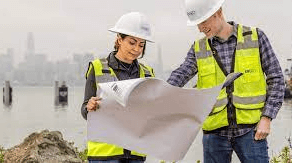
Geotechnical engineering services are vital for shaping successful projects through their expertise in soil analysis, foundation design recommendations, and diligent oversight throughout all stages of construction. Their contribution ensures safe structures that stand the test of time on solid ground! In this blog post, we will delve into the fascinating world of geotechnical engineering and explore how it is integral in shaping successful construction projects from concept to completion.
What is Geotechnical Engineering and Services?
Geotechnical engineering, often referred to as the backbone of construction projects, is a specialized field that deals with understanding and utilizing the properties of soil and rock to design safe and stable structures. It involves studying the behavior of earth materials under various conditions such as load, water flow, and seismic activity.
One might wonder why soil plays such a crucial role in construction. Every structure needs a solid foundation! Geotechnical engineers are responsible for evaluating the physical characteristics of soil at a project site to determine its stability and load-bearing capacity. This information helps them design foundations to withstand the forces exerted upon them. Intertek provides geotechnical services that include:
- Subsurface Investigation & Exploration
- Foundation Design & Analysis
- Geotechnical Laboratory Testing
- Geotechnical Engineering Surveys, Studies & Analysis
Geotechnical engineering continues beyond determining foundation designs. It also involves analyzing slopes to prevent landslides or erosion and assessing groundwater conditions to mitigate potential flooding risks. It consists in investigating subsurface contamination before undertaking any excavation works.
Geotechnical engineering is all about understanding how Nature interacts with man-made structures. By harnessing this knowledge, engineers can ensure that buildings stand tall against gravity’s pull. At the same time, bridges remain steadfast amidst turbulent winds.
The Role of Geotechnical Engineering in Construction
Geotechnical engineering plays a crucial role in the successful execution of construction projects. It involves assessing a site’s soil and rock conditions to determine their stability, strength, and suitability for various types of structures. By understanding the unique properties of the ground beneath our feet, geotechnical engineers can provide valuable insight into how to design and build solid foundations.
One primary responsibility of geotechnical engineers is conducting site investigations. This involves collecting and analyzing samples from different depths in a laboratory setting. The data helps determine soil composition, groundwater levels, and potential hazards like seismic activity or landslides.
With this information, geotechnical engineers can develop appropriate foundation designs for structures. They consider building loads, settlement expectations, and environmental conditions to ensure long-term stability and safety.
During construction, geotechnical engineers play an active role by monitoring the quality control processes related to earthworks. This includes overseeing excavation activities to ensure they are carried out according to specifications while minimizing risks associated with slope instability or ground movement.
In addition to their on-site involvement during construction phases, these experts conduct post-construction evaluations. They assess whether any unforeseen issues have arisen that may require remedial measures or ongoing monitoring.
Conclusion
We hope we guided you well how geotechnical engineering shapes successful construction projects. From the initial concept to the final construction, geotechnical engineers provide valuable insights and expertise that ensure structures’ stability, safety, and durability. Through various methods such as site investigations, soil testing, and analysis of geological conditions, geotechnical engineers gather vital data that helps architects and designers make informed decisions during the planning phase. Understanding the properties of soil and rocks beneath a project site can identify potential risks early on, and appropriate measures can be taken to mitigate them.
